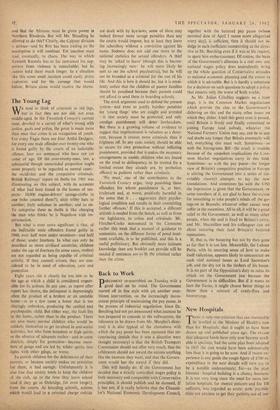The Young Lag
WE tend to think of criminals as old lags, but in fact they are not old; not even middle-aged. In the Twentieth Century's current issue, devoted to a survey of what's wrong with justice, gaols and police, the point is- made more than once that crime is an occupation of youth. For every Fagin there are four Artful Dodgers; for every one male offender over twenty-one who is found guilty by the courts of an indictable offence, four are sentenced who have not yet come of age. Of the over-twenty-ones, too, a substantial though unrecorded proportion ought more properly to be regarded. as mental cases: the recidivists and the compulsive criminals. British Railways' report on thefts for 1961 was illuminating on this subject, with its accounts of what had been found in the homes of sus- pects: 10,000 engine-drivers' sponge-cloths in one (who counted them?); sixty trilby hats in another; forty suitcases in another; and so on. To categorise these as thefts is like charging the man who thinks he is Napoleon with im- personation.
But what is even more significant is that, of the indictable male offenders found guilty in 1960, over half were under seventeen—and half of those, under fourteen. In what can only be described as more civilised countries, children under the age of fourteen (in some cases, twelve) are not regarded as being capable of criminal activity. If they commit crimes, they are con- sidered to be in need of education, care and protection.
Eight years old is clearly far too low to be the age at which a child is considered respon- sible for its actions. In any case, as report after report has shown, the delinquent is depressingly often the product of a broken or an unstable home—or in a few cases a home that is too cloyingly unbroken, producing the spoiled and psychopathic child. But either way, the fault lies in the home, rather than in the product. There are also many normal children who would be unlikely themselves to get involved in anti-social activities, but who from boredom or high spirits or the absence of adequate outlets—and in some districts, simply for protection—become mem- bers of gangs and are led by wilder spirits into fights with other gdngs, or worse.
To punish children for the deficiencies of their parents, or because society makes no provision for them, is bad enough. Unfortunately it is also true that society tends to keep the children of the rich, up to the time they leave school (and if they go to Oxbridge, for even longer), from the courts. At boarding schools, actions which would lead to a criminal charge outside are dealt with by bye-laws; some of them may indeed favour more savage penalties than any the courts would impose, but at least they leave the schoolboy without a conviction against his name. Sodomy does not add one more to the national statistics for sexual offenders. A thief may be 'asked to leave' (though this is becom- ing increasingly rare: he will more likely be sent to see the school psychiatrist), but he will not be branded as a criminal for the rest of his life. And this is how it should be; but it is mani- festly unfair that the children of poorer families should be penalised because their parents could not afford to send them to boarding schools.
The stock argument used to defend The present system—and even to justify harsher penalties for 'young thugs' who are caught and arrested --is that society must be protected, and only condign punishment will deter lawbreakers. But there is a growing volume of evidence to suggest that imprisonment is valueless as a deter- rent, because it creates more criminals than it frightens off. In any case, society should be able to secure its own protection without inflicting punishment, provided that it)makes the necessary arrangements to enable children who arc found on the road to delinquency to be treated (to a limited extent they already are, by probation officers) as patients rather than criminals.
'We must,' one of the contributors to the Twentieth Century urges, 'stop punishing those offenders for whom punishment is, at best, irrelevant and, at worst, positively harmful in the sense that it . . . aggravates their psycho- logical condition and results in their committing further offences.' If this is accepted, a different attitude is needed from the bench, as well as from our legislators, to crime and criminals. Mr. Fletcher-Cooke announced in the Commons earlier this week that a manual of guidance to sentencers, on the different forms of penal treat- ment available, is to be published, and this is a useful preliminary. But, obviously more intimate knowledge than any booklet can provide will be needed if sentences are to 'fit the criminal rather than the crime.






































 Previous page
Previous page